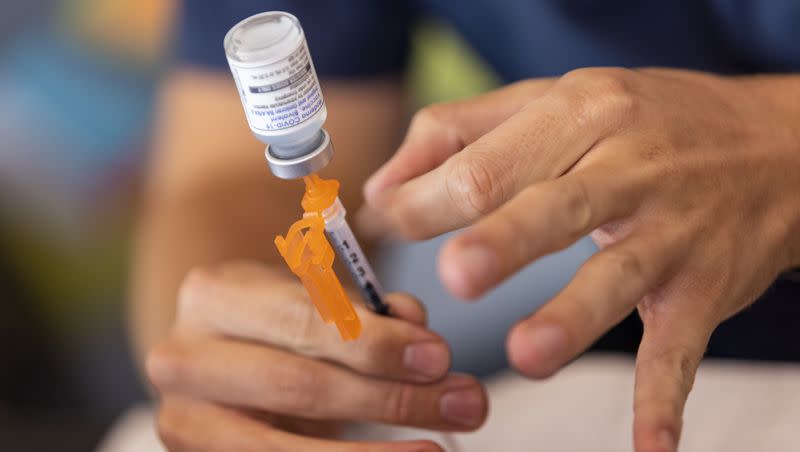Here’s why getting the new COVID-19 booster shot is being called ‘frustrating’

Ready to get that new COVID-19 booster shot? Well, you’ll probably have to wait a bit.
In Utah and across the country, the latest update to the vaccine, recommended for everyone 6 months and older, is hard to find. There are also issues with insurance coverage now that the federal government is no longer picking up the cost.
The delays come as COVID-19 cases and hospitalizations continue to climb nationwide. On Thursday, the Utah Department of Health and Human Services said seven new deaths from the virus had been reported in the state over the past week.
Related
Intermountain Health, the region’s largest health care system, doesn’t even have the new shots yet, spokesman Lance Madigan said.
“Please check back,” is what Intermountain Health patients are being told when they ask about getting the shot approved last week by the U.S. Food and Drug Administration and the Centers for Disease Control and Prevention.
Patients are advised that Intermountain is “waiting on vaccine supply, but to the best of our knowledge the entire system is delayed. Latest we are hearing is we should have all varieties of vaccine for different age groups by the first of October,” Madigan said.
Meanwhile, pharmacies nationwide are dealing with supply issues, offering only limited appointments that sometimes have had to be canceled when the vaccine hasn’t arrived as scheduled.
Related
Both Walgreens and CVS, pharmacy chains that have provided COVID-19 vaccinations throughout the pandemic, confirmed to NBC News that appointments to get the new vaccine have had to be canceled due to delivery delays to some stores.
“We are aware of isolated incidences at a small number of locations where appointments had to be rescheduled due to delays in supply,” a Walgreens spokesperson said, adding most stores “have supply to support existing patient appointments.”
Moderna and Pfizer representatives told The Associated Press there are enough shots.
Pfizer spokespeople said the manufacturer is not experiencing any shortages and has “shipped and delivered several million doses of its 2023-2024 COVID-19 vaccine,” the AP reported.
Moderna had 6 million doses of the new vaccine available as of Thursday, the manufacturer’s vice president of communications Chris Ridley told the AP.
But even if pharmacies have the new shots, some customers have had to be turned away because their insurance can’t be billed. Apparently, many insurance companies have yet to update their billing codes to include the new shots.
Related
Some people are being charged as much as $200 for the shot despite having health insurance, The Washington Post reported, citing “myriad complications,” including the vaccine not yet being a list of approved medical expenses.
“Now that the federal government is no longer buying and distributing all the shots, Americans must endure the usual headaches of dealing with insurance companies and a for-profit health care system,” The Washington Post story said.
Select Health, the Murray-based insurance company that has more than 1 million members in Utah, Idaho, Nevada, and soon Colorado, said in a statement the new vaccine is “set up that, yes, it’s covered and it’s covered effective today.”
Members can contact their health insurance provider or insurance company if there are questions about coverage, Select Health said, noting that with a new vaccine, “the set up process involved, that could be part of the issue people are facing nationally.”
The new shots are targeted at a recently circulating version of the virus, XBB.1.5, also known as Kraken. It’s since been replaced as the dominant variant by a close relative, EG.5, dubbed Eris. A new, highly mutated variant, BA.2.86 or Pirola, was identified this week in Utah.
The previous COVID-19 booster shot, available for more than a year, targeted an earlier variant along with the original strain of the virus responsible for the pandemic that began in early 2020.
Only about 17% of Americans — and just under 16% of Utahns — got that first booster shot.
The difficulties with the rollout of the latest COVID-19 shot isn’t doing anything to help boost those numbers, said Han Kim, a professor of public health at Westminster University in Salt Lake City.
Kim said the situation is discouraging not only to those “who really wanted to do the right thing and get the vaccine” but also everyone still on the fence about whether they want the shot.
“It is frustrating, especially given there is already a lot of reluctance. This is just kind of fuel to the fire, unfortunately,” he said, suggesting that what seem like preventable glitches are “just going to give them an excuse not to get vaccinated.”
But COVID-19 is “still a serious disease,” Kim said, urging Utahns to get the shots.
“There’s a very easy way to protect yourself, so I think you should take advantage of that,” he said. “Wait a week or so until all this stuff gets smoothed out. I think the more people that get the vaccine, the less of a surge we’re going to see this fall and winter.”

